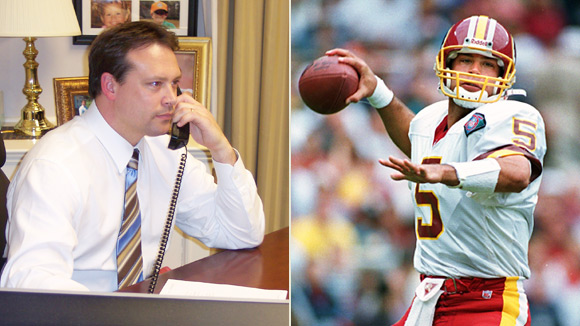The natural progression for most retiring athletes is into the broadcast booth. Sports fans watching TV at home are now privy to panels of four or five retired players or coaches, all giving expert analysis and inside takes. But what happens to those who weren’t outspoken enough during their playing careers to get into broadcasting? Not every professional athlete wanted his share of the limelight, creating a personality for the everyday fan. Nowadays, there seems to be a second career athletes can turn to besides sports broadcasting: politics.
In early November, there were a few big political events that took place. In terms of local politics here in Toronto, we elected a new mayor, as well as many new city counsellors. In the United States, the midterm elections in early November saw a surge of Republicans winning many seats in the Senate as well as congress. And when we look at these political results, we can conclude that: (a) former athletes are great at winning political races, and (b) mere sports personalities are not.
 |
| Jon Runyan (left) U.S. Congressman, New Jersey |
To find some politically adept athletes, we need to look no further than the 2010 U.S. Midterm Election. Jon Runyan was a 14-year NFL veteran playing most of his career in Philadelphia, including one Pro Bowl nomination in 2002. He retired last year and quickly found himself on the political circuit. One year out of football and Jon Runyan, a man ranked as the 2nd dirtiest player in the NFL by Sports Illustrated magazine (1), was the new congressman for New Jersey.
Heath Shuler was once a promising young Quarterback for the Washington Redskins, drafted 3rd overall in 2004 after finishing as runner-up for the Heisman Trophy in College Football. However, his play in the NFL was simply abysmal by football standards, throwing 21 interceptions to merely 5 touchdowns in his final three years of what turned out to be a short four-year career. ESPN has ranked him as the 4th biggest draft bust of all-time (2) and the 17th biggest sports flop in the past 25 years (3), but that has not stopped his new found political career. In 2006, Shuler won a seat in congress representing the State of North Carolina, and this past November won his bid for re-election.
Make no mistake; these athletes have the finances, the connections, and the recognition to thrive in politics. That being said, sports personalities had a tough run in politics recently, personalities being those involved in sports, but not athletes themselves.
In local Toronto politics, Sportsnet television anchor Sean McCormick recently fell short in his bid for City Counsellor in Toronto’s 19th Ward. Neither his small town celebrity status, nor the status of his sports TV anchor wife, Jennifer Hedger, could push him past eventual winner Mike Layton. Granted, Layton does have a political celebrity status himself, being the son of NDP leader Jack Layton. Nonetheless, McCormick finished 3rd in votes.
The biggest sports personality in the recent elections was Linda McMahon, former CEO of World Wrestling Entertainment (WWE, formerly known as the WWF (World Wrestling Federation)). Mrs. McMahon did not have the personality as her husband, Vince, in the WWE’s on-screen antics, instead running the company mostly backstage. Together the two made the WWE into a multi-billion dollar company that is now available on the New York Stock Exchange. Despite personally financing over $40 million into her own campaign for Senate in Connecticut (4), Mrs. McMahon lost convincingly on Election Day by 11 points. (5)
I guess the message is clear both at home and abroad: sports athletes are larger than life and can accomplish anything. It doesn’t matter if one’s a dirty player (Runyan) or a flop (Shuler), pro athletes running for politics is a natural succession. For the rest of us behind the scenes in sports, there are still a lot of glass ceilings to break.
aa.



Well said!
ReplyDelete